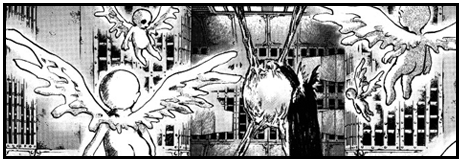
Baroque Glossary
I get occasional inquiries about the terminology I chose for my original, unofficial translation. To answer these questions (and to provide a deeper look into the writing of Baroque), I'll be explaining the most notable differences between my localization and the official localization by Atlus USA.
"Thing" Names
Many of the outsider NPCs follow the naming convention “Xの者” (literally “person of X”). I’m assuming the localization came up with names such as “Box Bearer” and “The Bagged One” because occupations in Japanese are often written as “X者”, where X is the subject of their vocation. Following this logic, the localization attempts to create a profession out of whatever subject (X) is offered, most noticeably in “The Collector” (lit. Person of Things). The character “者” is used this way most of the time, and is usually pronounced as “sha” or “ja” in these instances. You’ve probably already heard it in the names of professions such as “geisha” or “ninja”. However, the “者” present in Baroque names is not read as “sha”, but as “mono”. It varies depending on context, but reading “者” as “mono” is an old-fashioned way of referring to someone in a demeaning or dehumanizing manner (“coward”, “traitor”, “fool”, etc.) The Coffin Man and Horned Woman receive proper “man/woman” descriptors as they are still recognizably human, while the more deformed characters are labeled with a lowly “mono”. It’s for this reason that I’ve chosen to translate “者” as “Thing”. This also preserves the wordplay present in Thing Thing’s name, which is read as “mono no mono” in Japanese.
It’s interesting to note that all of the Malkuth members use this archaic naming convention to refer to deformed NPCs that aren’t members of the Order. The sole exception to this rule is Urim and Thummim, who believe that it is wrong to condemn anyone for being distorted. As such, they refer to Neck Thing as “Neck Man”.
Baroque Salesman vs Baroquemonger
This is entirely irrelevant to the original game, as the term is only referenced in the prequel stories and the remake. I chose "salesman" as the original Japanese name is neutral and doesn't hold the negative connotation that "-monger" carries. Another aspect of the "屋" used in his title is that it can be preceded by an adjective to describe someone who exhibits the quality of that adjective. Since the titular "Baroque" concept can be either a noun or an adjective, his Japanese name can either mean "a person who sells Baroques" or "a person who is Baroque" (which serves as subtle foreshadowing in the novel). To get this dual-meaning to work, the NPC's title has to be two separate words (i.e. a "Baroque Salesman" is either someone who "sells Baroques" or a "salesman who is Baroque"). On the contrary, the single word "Baroquemonger" used for the localization can only be read one way.
Guardian Angel vs Doctor Angelicus
The name of this character literally reads as "The Angel of Divine Guidance". The Archangel also has a rather awkward to translate title in Japanese - "Senior Angel" or "Advanced Angel". Atlus made a good call and localized "Advanced Angel" as "Archangel", because an Archangel is what we call a higher-ranking angel in English. I followed their logic and applied it to this character as well, to come up with "Guardian Angel" (because an angel that provides divine guidance is exactly that). Instead, the localization appears to have reverted the character's name back to what she was called during development: "Doctor Angelicus".
Her speech features frequent but inconsistent use of katakana, which could indicate a variety of things. I chose to portray this as abrupt CAPITALIZATION, as she will use katakana and regular hiragana interchangeably when saying identical words. This likely rules out the possibility of her having an accent (a common reason for writing a character’s speech in katakana), and instead seems to suggest that she’s having difficulty controlling her voice (possibly due to her distortion). The remake seems to have come to the same conclusion and therefore applied a distortion filter to all of her voice lines, thus eliminating the need to find a way around localizing her unusual text.
Worker Angels vs Fist/Scythe/Brain/Neophyte, etc
Like in the case of Doctor Angelicus, the localization seems to have made the decision to rename many of lower-ranking angels within the Malkuth Order. Units more uniformly referred to as "Worker Angels" received unique, edgier names like "Fist", "Scythe", and "Gasmask". Sting also made the decision to change the vengeful Worker Angel into a character from the Baroque Missing Paradigm manga.
Crypt Angel vs Cursebringer Angel
The character's name literally translates to "Cursed Burial Angel", or an angel that was improperly buried. I can't know for sure, but I assume Atlus went with "Cursebringer" because desecrated burial sites in Japan are generally thought to generate curses/impurity in the surrounding area. I feel that "Cursebringer" is too ominous and suggests that players should beware this NPC. I certainly thought that overusing his services might be inviting disaster when I first played Baroque for this exact reason (as the remake was my introduction to these games).
For a time I went with the simplified “Cursed Angel”, but later chose to favor the ‘burial’ aspect of the name which resulted in “Crypt Angel”. Crypts have a creepy, impure connotation in English speaking cultures, so this term was about as close as I could get to acknowledging both aspects of the original name. “Baroque World Guidance” has a lot of terribly translated English suggestions for names/terminology, but they call him “Entomb Angel” - also favoring to emphasize the burial aspect over the cursed element.
Sense Sphere vs Consciousness Orb
The Japanese "感覚球" literally translates to "Sensory Ball", similar to the Japanese term for "eye ball". This is because they're the sensory organs of God, and the name needs to directly reflect that in order to help the player better understand the world they're slowly discovering throughout the course of the game. The official translation's use of "Consciousness Orb" completely misses the point and instead conflates them with the introductory "Consciousness Simulation" sequence. "Consciousness Orb" is also a pain to pronounce. "Sense Sphere" is my attempt at a more elegant term which also preserves the original meaning.
The God of Creation and Preservation vs the Absolute God
Literally translated, the unwieldy name of God reads "The God of Creation and Maintenance". Yonemitsu explains the thought process behind this name in multiple interviews. He wanted it to convey that it's the ultimate creator of the universe, and also that it's the entity which maintains the data comprising said universe. "Absolute God" certainly captures the idea that it's the one true creator, but it drops the part about actively maintaining the world. I went with the more literal and cumbersome "God of Creation and Preservation", but shortened that to "Creator and Preserver" whenever possible for brevity's sake.
This is, unfortunately, entirely necessary due to the wordplay throughout Baroque’s script. The “preservation” in God’s title is used in several other areas in an attempt to draw parallels throughout the plot. For example, “It’s not possible to preserve the two of them with only one heart.” I would have used the “Divine Perpetuator” title suggested by various STING publications, but this otherwise excellent title unfortunately omits the “Creator” aspect entirely. In the end, “Creator and Preserver” was the only remaining option.
Distorted Delusions vs Twisted Fantasies
This was a very close call, but again, the aforementioned wordplay present in the script was the determining factor. “Twisted fantasies” is certainly the better choice for accurately capturing the slightly suggestive nature of the original phrase. But again, these two words will come up in several different contexts elsewhere in the script. The biggest problem by far is how to make “twist” fit into the other situations it’s used in. Anytime someone refers to “a distortion”, Atlus is forced to say “a twisting” in order to stay consistent. Phrases like “My twisting hasn’t finished yet,” are incredibly awkward, and in my opinion, having a slightly more accurate translation of “distorted delusions” isn’t worth the hassle. This isn’t so much an issue for “fantasies” as opposed to “delusions”, but I still stuck with the original FMV intro’s use of “delusions” because I felt it flowed better when paired with “distorted”.
Grotesques vs Meta-beings
The original Japanese script uses kanji that can be read in two ways: either the more judgemental sounding “igyou” (strange or suspicious looking) or the more clinical “ikei” (something with an atypical appearance). In the west, we use the term "Grotesque" when trying to convey the same thing, as it’s a word with multiple connotations depending on context and perception. The term has a rich history of use in multiple countries and deep ties to art (including that of the Baroque period). From Wikipedia: "...a general adjective for the strange, mysterious, magnificent, fantastic, hideous, ugly, incongruous, unpleasant, or disgusting, and thus is often used to describe weird shapes and distorted forms… Rémi Astruc has argued that although there is an immense variety of motifs and figures, the three main tropes of the grotesque are doubleness, hybridity and metamorphosis.” These motifs are also heavily represented in Baroque’s enemies, from their Tarot-inspired dual naming conventions to their nature as transmogrified humans.
Meanwhile, the official Atlus localization uses “Meta-Being” which outright misses the dual-interpretation by making up a brand new fantasy term. It's a matter of opinion, but I also personally think that "Meta-Being" sounds like the kind of embarrassing, pseudo-sophisticated name you'd find in a Saturday morning cartoon.
Niculi and Nicula vs Nicl and Nicr
The names of the individual enemies don't really matter (and don't appear in the original game), but the choice Sting (?) made for this particular enemy is atrocious and sounds like a racial slur if you say it out loud. Yonemitsu clarifies the name was inspired by the "Funiculi Funicula" song, so you really can only read it as "Niculi and Nicula". Additionally, the name of the "Glue" enemies from the remake's localization is spelled exactly the same way as the "Grue" creatures of Zork fame. Atlus likely changed this to avoid copyright issues.
Nerve Tower vs Neuro Tower
The original Japanese term can also be read as "Path to God". This is something that both terms omit (because it's impossible to express it in English), but "Neuro" is another unnecessary (and lame) attempt to make "Nerve" sound more sophisticated. The Nerve Tower is supposed to be analogous to a literal nerve structure which is wired up to God, hence "nerve". "Neuro" relates to the brain, but in a nonspecific sense that muddies the original intent.
Great Heat Wave vs the Blaze
"Blaze" (besides being another tacky 'cool' name) implies an intense increase of temperature, but doesn't really describe the phenomenon beyond that. My translation is 100% literal here, as "Wave" effectively illustrates that the cataclysm emanated outward from a single source (the Nerve Tower). This is a vital early clue to the plot, and it simply didn't need to be changed.
“You guys”
In the original Japanese script, the Sentry Angel often refers to the main character in the plural - providing subtle foreshadowing to the protagonist’s existence as countless clones. It’s both clever and endearing, creating an image of the Sentry Angel trying to herd a multitude of clueless and stubborn #12s away from the cloning laboratory. Unfortunately, Atlus removed this element entirely, so the Sentry Angel only ever addresses the player character as “you”.
Flesh
(Idiot Flesh vs Guryu Flesh, Average Flesh vs Churyu Flesh, Genius Flesh vs Kenryu Flesh)
I suspect Atlus chose to leave these items untranslated because it didn't make sense to them that the flesh cuts would have intelligence ratings (as they do in the original Japanese text). There is absolutely significance to these strange names, and so I've properly translated them as they were originally meant to be read.
Worms vs Parasites
The original Japanese script refers to the parasite items as both "寄生虫" (parasite) and "虫" (insect/worm). Again, Atlus flattened the terms into just "parasite" while I preserved the distinction. Whenever only "虫" is used, I chose to translate it as "worm", since Yonemitsu clarifies that the creatures are cameos of the earthworms from Baroque's canceled predecessor "A Life of Catching Grubs". This wasn't an option for Atlus, since Sting's remake idiotically replaces the worms' original design with one of Fuji's early, rejected (!) concepts. The resulting facehugger ripoffs that Atlus ended up having to deal with can only be described as "parasites", so their naming choice is completely understandable.
Bizarrely, the most prominent worms/insects in the game are not items but rather the Littles themselves. In the original Japanese script, they are interchangeably referred to as “Littles”, "Angelic Insects", and “Little Angelic Insects”. I left this distinction in, while Atlus flattened the two terms into one. I created a bit of an inconsistency in calling the Littles “insects” rather than “worms”, but their limbs exclude them from the latter classification.
Incidentally, the Guardian Angel uses a female pronoun when referring to the Littles.
Speech Patterns
The characters of Baroque have colorful and varied speech patterns, but all of this nuance was discarded in the official localization. The members of the Malkuth Order are quite old for the most part, and so they frequently use antiquated language. This stands out especially in the case of the much younger Archangel, who often throws out incongruous, archaic verb conjugations whenever he's feeling particularly insecure or vulnerable - often in an attempt to sound smarter and more authoritative than the protagonist. You can sometimes use this to tell when he's lying, as the urgency of what he's saying won't be backed up by his 'sophisticated' speech (for example, when he tries to convince you that his Sense Sphere is breaking down). I did my best to keep his archaisms intact, while also not making them sound too tacky or out of place. Atlus instead opts for a uniform and constant pretentiousness that never fluctuates. As the game progresses, the Archangel begins to talk to you more naturally and stops using these speech patterns so often. Other characters do this as well, such as Sack Thing. Her quotations are very stilted at the beginning ("X was speaking. They said, 'Y'"), but these become more relaxed as you talk with her more ("X was speaking. 'Y'"). You can then see that she's temporarily shocked into normally quoting people ("X said, 'Y'") by Neck Thing's death. It's also this erosion of her Baroque that probably contributes to her losing the will to live later.
These are only two examples, but Baroque was originally filled with them. There's Thummim's macho speech, which is later shown to be a pretense when you discover what a coward he is. The Crypt Angel uses a bizarre hodgepodge of language and dialects, as if even his words are constantly combining and transmuting. The Guardian Angel struggles to come down to your level as she begins working unnatural sounding politeness into her authoritative requests. Unsettling katakana is employed by Box Thing when he directly addresses his daughter, showing an emotional distance and contempt for her condition. The list goes on, but none of this made it through the official localization. Translating subtext is very difficult but trying your best is essential when it comes to these tiny details, as they can relay so much unspoken information about a character's emotional journey. I hope my efforts can at least convey some of that. In instances where direct translation was impossible, I took the mood created by these details into account. In the instance of Box Thing's use of katakana, for example, it changes the ambiguously cold and threatening "[undefined subject] would be happier if we died together" statement into the definitely cold and threatening "I would be happier if we died together". In these situations however, I was always careful not to fabricate details (for example, this line's structuring already strongly suggested that he was talking about his own happiness).
|










